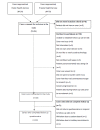A Smartphone App to Support Carers of People Living With Cancer: A Feasibility and Usability Study
- PMID: 30702432
- PMCID: PMC6374733
- DOI: 10.2196/11779
A Smartphone App to Support Carers of People Living With Cancer: A Feasibility and Usability Study
Abstract
Background: Carers experience unique needs while caring for someone with cancer. Interventions that address carers' needs and well-being have been developed and tested; however, the use of smartphone apps to support adult carers looking after another adult with cancer has not been assessed.
Objective: The objective of this study was to test the feasibility, usability, and acceptability of a smartphone app, called the Carer Guide App, for carers of people with colorectal cancer.
Methods: We recruited carers of people with colorectal cancer from outpatient day oncology units and provided them with access to the smartphone app for 30 days. Carers had access to video instructions and email contact details for technical support. Carers received 2 email messages per week that directed them to resources available within the app. Carers completed demographic questions at baseline and questions related to feasibility and usability at 30 days post app download. We used recruitment and attrition rates to determine feasibility and relevance of content to carers' needs as self-reported by carers. We assessed usability through the ease of navigation and design and use of technical support or instructional videos. Acceptability was measured through self-reported usage, usage statistics provided by Google Analytics, and comments for improvement.
Results: We recruited 31% (26/85) eligible carers into the trial. Of the 26 carers, the majority were female (19, 73%), on average 57 years of age, were caring for a spouse with cancer (19, 73%), and held a university degree (19, 73%). Regarding feasibility, carers perceived the content of the Carer Guide App as relevant to the information they were seeking. Regarding usability, carers perceived the navigation and design of the app as easy to use. Of the 26 carers, 4 (15%) viewed the downloading and navigation video and 7 (27%) used the contact email address for queries and comments. Acceptability: On average, carers used the smartphone app for 22 minutes (SD 21 minutes) over the 30-day trial. Of 26 participants, 19 completed a follow-up questionnaire. Of 19 carers, 7 (37%) logged on 3 to 4 times during the 30 days and 5 (26%) logged on more than 5 times. The majority (16/19, 84%) of carers stated that they would recommend the app be available for all carers. Comments for improvement included individualized requests for specific content.
Conclusions: The Carer Guide App was feasible and usable among carers of people with colorectal cancer. Acceptability can be improved through the inclusion of a variety of information and resources. A randomized controlled trial is required to assess the impact of the Carer Guide App on carers' health and well-being.
Keywords: cancer; carer; mobile app; mobile phone; smartphone; technology.
©Natalie Heynsbergh, Leila Heckel, Mari Botti, Patricia M Livingston. Originally published in JMIR Cancer (http://cancer.jmir.org), 31.01.2019.
Conflict of interest statement
Conflicts of Interest: None declared.
Figures
References
-
- Deloitte. 2015. The economic value of informal care in Australia in 2015 https://www2.deloitte.com/au/en/pages/economics/articles/economic-value-... .
-
- Lambert S, Levesque J, Girgis A. The impact of cancer and chronic conditions on caregivers and family members. In: Koczwara B, editor. Cancer and chronic conditions: addressing the problem of multimorbidity in cancer patients and survivors. Singapore: Springer; 2016. pp. 159–203.
LinkOut - more resources
Full Text Sources


